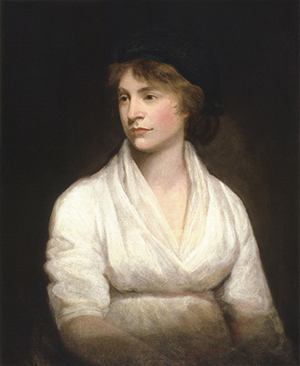Mary Wollstonecraft's love letters to Imlay and her sociological work make as antithetical reading as ever came from any one pen.
 This quote, from Mary Shelley's biographer, Muriel Spark, captures the contradiction that lies at the heart of the life and work of the philosopher often credited as the first feminist: Mary Wollstonecraft.
This quote, from Mary Shelley's biographer, Muriel Spark, captures the contradiction that lies at the heart of the life and work of the philosopher often credited as the first feminist: Mary Wollstonecraft.
Mary Wollstonecraft's A Vindication of the Rights of Woman was published to immediate success in 1792. Like Simone de Beauvoir's The Second Sex, Wollstonecraft's Vindication is a foundational text of the feminist movement. It demands rights for women, calling for them to be educated, and for their learning to be equal to that of men. Women have been schooled to believe that the "highest praise is to obey, unargued - the will of man", with the result that "women are almost sunk below the standard of rational creatures". Rationality and independence are central to Wollstonecraft's philosophy: transformation in women's education can "make women rational creatures, and free citizens".
Soon after the publication of Vindication, Mary travelled to France to report on the Revolution. In Paris she met Gilbert Imlay, an American who had fought in the War of Independence, and, unknown to Mary, a man of questionable moral character and promiscious habits. Mary fell deeply in love, and at first the affection was mutual, but Imlay's absences from Paris became more frequent. By September 1793, Mary had devoted all her feelings, thoughts and actions to the continuance of their relationship. Imlay was away on business, leaving Mary alone in Paris as the Reign of Terror raged around her, when she wrote:
I do not know how I fell into these reflections, excepting one thought produced it -- that these continual separations were necessary to warm your affection. --Of late, we are always separating. --Crack! --crack! --and away you go. ...some melancholy tears have found their way into my eyes, that linger there.
In 1794, Mary joined Imlay in Havre and gave birth to their daughter, Fanny. Imlay soon left Havre for London, and Mary returned to Paris, assured by Imlay that they would be reconciled soon. But in April 1794, Mary's worst fears were realised when she travelled to London to join Imlay, and discovered he was living with a new lover. A letter dated 22 May records Mary's torment:
It seems to me that I have not only lost the hope, but the power of being happy. --Every emotion is now sharpened by anguish. --My soul has been shook, and my tone of feelings destroyed.
In her despair, Mary made her first unsuccessful suicide attempt.
In April 1795, Mary set out for Norway to conduct business on Imlay's behalf. In early October of the same year, Mary returned to London, but she did so with a heavy heart and a foreboding sense of loss. Imlay had promised to meet her on the homeward journey but did not arrive. Mary reached London to have her suspicions confirmed: Imlay was living with yet another woman. Worn down by sorrow and grief at Imlay's betrayal, Mary resolved to end her life:
I would encounter a thousand deaths, rather than a night like the last. Your treatment has thrown my mind into a state of chaos; yet I am serene. I go to find comfort, and my only fear is, that my poor body will be insulted by an endeavour to recal my existence. But I shall plunge into the Thames where there is the least chance of my being snatched from the death I seek.
It was dark and raining when Mary arrived at Putney Bridge, and after walking up and down until her clothes were drenched, she threw herself into the river. She was rescued, though unconscious, and her life was saved.
In her feverish distress, Mary made one last desperate attempt at reconciliation. She suggested to Imlay she would share a home with him and his new mistress. Imlay acquiesced at first, but shortly afterwards withdrew his agreement.
In one of Mary's final letters to her lover, dated December 1795, hopeful of Imlay's better nature against all evidence to the contrary, the philosopher who had championed women's rationality and independence wrote:
It is strange that, in spite of all you do, something like conviction forces me to believe, that you are not what you appear to be.
(Sources: Mary Wollstonecraft and Gilbert Imlay, The Love Letters of Mary Wollstonecraft to Gilbert Imlay; Mary Wollstonecraft, A Vindication of the Rights of Woman)







